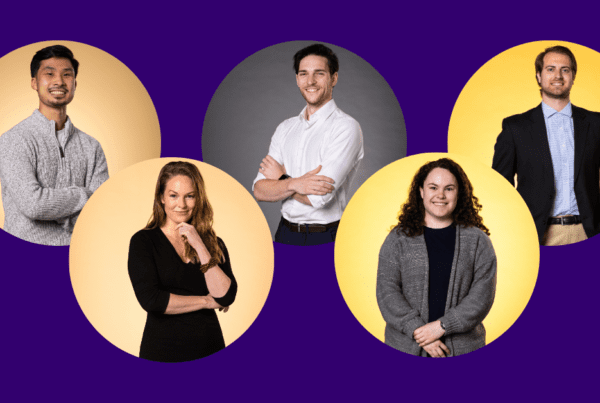There’s never been any question about what profession Lucia Ramirez, MD, wanted to pursue. For as long as she can remember, she wanted to be a physician.
“My dad was a doctor in Mexico,” she says. “As a child in Tijuana, I remember going to visit him in the hospital. I would wear my lab coat and run around.”
That childhood passion eventually led her to medical school. She fulfilled her dream, graduating from the Autonomous University of Baja California in Tijuana. And, as a member of the 2023 incoming class of internal medicine residents at UW Medicine, she’s a trailblazer. Ramirez is the first doctor trained in Mexico to match with the program.
The road to internal medicine and helping patients
As Ramirez grew up, so did her interest in medicine. She notes that Tijuana is a special place, filled with opportunities, dreamers and people looking for a better life, but it was also a tumultuous, dangerous place during her childhood due to cartel wars. As the violence escalated around her, she coped by following her grandmother’s wisdom.
“My way to handle the horrors was to heed my grandmother’s advice and dedicate myself to helping others,” she says. “I wanted to help where I could and build up my community to fight for a better tomorrow.”
When Ramirez moved with her family to San Diego for her high school years, she took with her the desire to make a positive impact on the lives of others. When she became a medical student, she crossed the border into Mexico every day to attend class. Over time, she discovered she enjoyed the diagnostic process that gave people answers to their health questions. But she realized the true avenue to making a difference in patient lives was with education and communication.
“In one of my clinical rotations, I noticed a large number of patients waiting for lower extremity amputations due to diabetic complications,” she says. “I was surprised to hear how uninformed many patients were about their disease and management. It was profound to notice that most people could avoid losing a limb or their eyesight if they had access to good treatment and education.”
Recognizing a need
The importance of clear communication hit home as Ramirez toggled between her English-speaking and Spanish-speaking communities.
“When I first moved to the U.S., it was very confusing trying to learn and communicate when I didn’t know the language,” she says. “I couldn’t imagine going through the same thing, but with a medical condition. It would be that much scarier if you didn’t know how to communicate your needs or your questions.”
Simultaneously, she recognized a lack of Spanish-speaking physicians in the United States. It’s a national challenge, but the problem is particularly stark in Washington state.
A recent study conducted by the Latino Center for Health on the Latino physician workforce in Washington also revealed that despite Hispanics making up nearly 15% of the state’s population, only about 4% of physicians are of Hispanic descent. As a result, Hispanic patients may feel disconnected from their physicians.
Opening lines of communication
Ramirez wanted to help address this need. To start, she applied for an observership with Lorena Alarcon-Casas Wright, MD, an endocrinologist at the UW Medicine Diabetes Institute and founder and director of the LatinX Diabetes Clinic.
“I was able to obtain this observership because Dr. Alarcon-Casas Wright accepted my petition. I believe if more doctors or universities would give international medical graduates this opportunity, they would see the unique skills international medical graduates offer that can help their program and their patients,” says Ramirez.
Having more doctors like Ramirez pursue internal medicine and diabetes care is critical, Alarcon-Casas Wright says, so Latinx patients can receive better care that is culturally appropriate.
“When it comes to endocrinology and diabetes, it is important to have a solid relationship with your provider because your chronic condition needs continuous follow-up,” Alarcon-Casas Wright says. “It’s essential to be able to trust your doctor. But when there’s a language barrier, or you don’t see yourself represented in the healthcare system, everything seems like a bigger hurdle.”
By participating in the observership, Ramirez not only had an opportunity to learn more about some of the patients’ diabetes questions and needs in their native language directly, but she also learned to provide additional types of care to marginalized communities. For example, once a week, she shadowed Alarcon-Casas Wright during the delivery of gender-affirming care.
The experience at the UW Medicine Diabetes Institute and the LatinX Diabetes clinic is what sparked Ramirez’s interest in pursuing a residency in internal medicine.
Matching with UW Medicine
The chance to improve healthcare for a large Latinx population was a big reason Ramirez applied to the UW Medicine Internal Medicine Residency. However, it wasn’t the only draw, she says.
“UW Medicine really values diversity. It’s a collaborative environment, and I really like that,” she says. “We can rotate through different hospitals. We can work with LGBTQ+ populations. We can work with the underserved in the unsheltered population. UW Medicine simply provides a lot of great opportunities.”
Through matching with UW Medicine, Ramirez also has the potential to open doors for other international students, Alarcon-Casas Wright says. And Leo Morales, MD, PhD, assistant dean of the Office of Health Care Equity and a clinician at the LatinX Diabetes Clinic, agrees.
“As the COVID-19 pandemic showed us, UW Medicine and the Pacific Northwest need more culturally and linguistically diverse physicians. Offering training opportunities to foreign trained medical doctors that share a background with underserved communities in Washington state is an important means of diversifying our physician workforce,” says Morales.
For both Morales and Alarcon-Casas Wright, Ramirez represents a bright future for international students.
“Like Ramirez, many international medical graduates are motivated, strong candidates. We should give them an opportunity to be part of academic medicine,” says Alarcon-Casas Wright. “Their language, experiences and culture are all invaluable to the future of quality patient care.”


